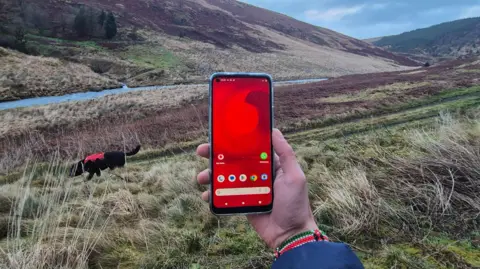In a groundbreaking development, Vodafone has claimed to conduct the UK’s first-ever satellite-enabled smartphone video call, marking a significant milestone in telecommunications technology. This historic call took place on a picturesque mountain in Ceredigion, which is situated in west Wales. The purpose of this endeavor is to introduce satellite connectivity into Vodafone’s UK phone network by the end of the current year, with plans to extend this service throughout Europe by 2026.
Vodafone’s CEO, Margherita Della Valle, emphasized the transformative potential of this technology, suggesting that it could eradicate the so-called “not spots,” or areas where mobile signals are completely absent. This issue is particularly concerning, with the telecommunications regulator, Ofcom, estimating that approximately 9% of the UK suffers from inadequate mobile coverage. However, experts have cautioned that significant regulatory hurdles must be navigated, alongside the deployment of a more extensive fleet of satellites, for this innovative service to become widely accessible.
Astronomers have expressed apprehension regarding the rapidly increasing number of satellites being launched. They argue that the proliferation of these satellites could significantly hinder astronomical research, as they produce bright streaks in images, which can contaminate observations of celestial bodies and phenomena. This presents a dual issue as researchers are concurrently striving to understand the universe while grappling with the challenges posed by a congested orbital environment.
The satellite connectivity demonstrated by Vodafone allows regular smartphones to access the internet, even in areas where traditional cellular coverage is lacking. While many smartphones, including popular iPhone and Android models, already possess emergency satellite connectivity, it is currently limited to text messaging capabilities. Vodafone’s advancement to include video calling represents a pivotal step in making universal connectivity a reality. Della Valle stated, “It’s a really important moment because we are opening the door to universal connectivity, connecting people in the UK, wherever they are.”
Della Valle described the satellites being utilized as “antennas in the sky,” clarifying that these would serve as an additional layer of connectivity rather than replace traditional infrastructure like cell towers. Importantly, users will not need any additional equipment to take advantage of this service, although the specifics regarding costs for customers remain undetermined. Vodafone’s partnership with AST SpaceMobile—a satellite company with a limited number of operational satellites—complicated the recent test. The timing had to be precisely coordinated with the positioning of the satellites for effective communication.
Analyst Luke Pearce from CCS Insight pointed out that the new satellite company needs to establish a comprehensive constellation in orbit to provide consistent service. Moreover, the regulatory framework surrounding such satellite services requires careful consideration, which will also impact competitors, like Starlink owned by Elon Musk. In response to this regulatory need, Ofcom has announced plans to consult on the matter in early 2025.
In addition to the challenges associated with technological advancements in telecommunications, the astronomical community is deeply concerned about the environmental impact of this satellite surge. The International Astronomical Union (IAU) highlighted the disruptive effects of these satellites on observing celestial phenomena, stating that the new satellites can leave unwanted bright streaks in astronomical images. Astrophysicist Dr. Megan Argo echoed these sentiments, noting the complications arising in monitoring the wider universe and casting a critical eye on the potential for detecting hazardous asteroids, which are crucial for planetary defense.
Despite the critical concerns, astronaut Tim Peake, who partook in the video call, offered a contrasting viewpoint, suggesting there remains “plenty of room” in space for additional satellites. He called for ongoing discourse about the management and regulation of rising satellite numbers while emphasizing the necessity to protect the orbital environment for future generations. As satellite technology continues to advance and expand into uncharted territories, the balance between utility and sustainability will be essential in governing our growing presence in space.



